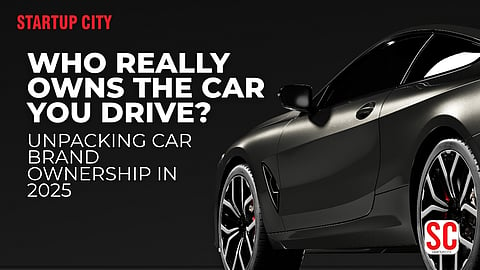

Have you ever looked at a car logo and wondered if it truly represents the company that made the vehicle? In 2025, the automotive industry is less about the name on the badge and more about the corporation pulling the strings behind the scenes.
Whether it's a luxury sedan or an electric SUV, the brand you recognize might be owned by a much larger parent company you’ve never considered. For businesses, consumers, and investors, understanding who owns what is more than trivia. It’s insight into reliability, innovation, and market influence.
Let's dive into the complex world of automotive brand ownership, focusing on both the global picture and what it means for India.
Mergers, acquisitions, and partnerships have shaped the car industry over decades. Rising R&D costs, emissions regulations, and the EV revolution have made it tough for smaller brands to stay independent. As a result, major companies now manage multiple car brands across market segments and geographies.
The outcome? A Toyota could be collaborating with Subaru behind the scenes. A Volvo may be built on a platform shared with a Polestar, both owned by a Chinese parent. This web of ownership impacts everything from vehicle design to pricing.
Here’s a breakdown of global car brands and the corporations that control them today:
Brands: Chevrolet, GMC, Cadillac, Buick
Brands: Ford, Lincoln
Brands: Jeep, Chrysler, Dodge, Ram, Fiat, Alfa Romeo, Maserati
Brands: Toyota, Lexus
Notes: Holds stakes in Subaru and Suzuki
Brands: Hyundai, Kia, Genesis
Brands: Jaguar, Range Rover, Defender, Discovery
Brands: Volkswagen, Audi, Porsche, Bentley, Lamborghini, SEAT, Skoda, Cupra
Brands: BMW, Mini, Rolls-Royce
Brands: Mercedes-Benz, Smart
Brands: Volvo, Polestar, Lotus
Brands: Renault, Nissan, Mitsubishi, Infiniti, Dacia
Brands: Honda, Acura, Afeela (with Sony)
Brands: Tesla (independent)
Brands: Rivian
Brands: VinFast
India’s auto market reflects this global integration. Tata’s ownership of Jaguar and Land Rover has brought prestige to Indian manufacturing. Hyundai and Kia have entrenched themselves deeply in Indian cities, offering high-tech and design-driven options at competitive prices.
Maruti Suzuki, while viewed as Indian, is majority owned by Suzuki Motor Corporation (Japan). Toyota and Honda maintain strong dealer and service networks across the country. And while luxury car buyers may lean toward BMW or Audi, their vehicles are often assembled locally to reduce cost.
These brand relationships affect pricing, availability, and even the service experience.
Some brands have faded but are still seen on Indian roads:
Pontiac (GM)
Mercury (Ford)
Scion (Toyota)
Saab (assets held by NEVS)
These brands may no longer sell new cars, but service networks and spare parts are still available.
Understanding brand ownership helps you:
Evaluate long-term service reliability
Compare vehicles built on shared platforms
Understand how parent companies invest in R&D and electric vehicle transitions
Make informed purchase and investment decisions
For example, Toyota’s quiet reliability extends to Lexus. Volvo’s safety-first DNA can now be found in Polestar EVs. And Tata’s efforts in sustainable design shape Jaguar Land Rover’s next-gen line-up.
As the EV race accelerates and global markets shift, the auto industry will likely see more consolidation and new players. Today’s badge could belong to a new parent tomorrow.
Staying informed helps you make better choices, whether you’re buying a car, investing in a company, or just keeping up with the business of mobility.